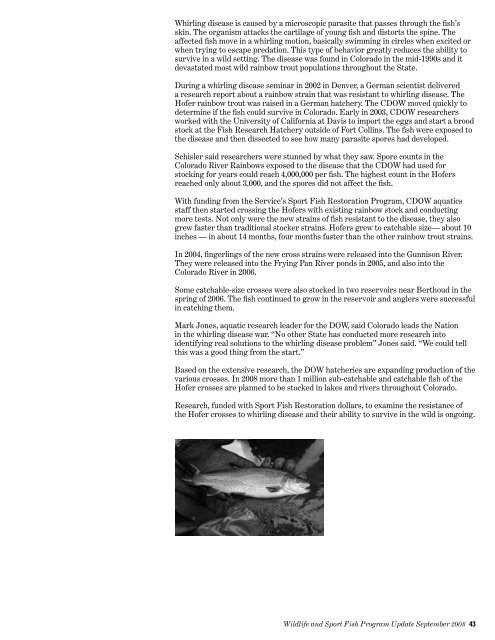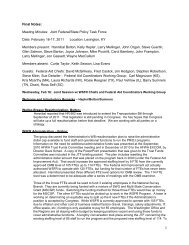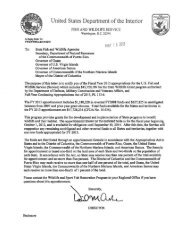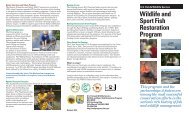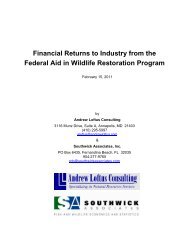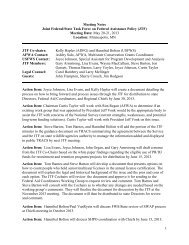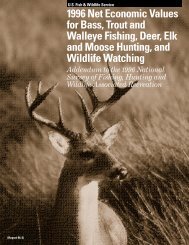Program Update - Wildlife and Sport Fish Restoration Program - U.S. ...
Program Update - Wildlife and Sport Fish Restoration Program - U.S. ...
Program Update - Wildlife and Sport Fish Restoration Program - U.S. ...
You also want an ePaper? Increase the reach of your titles
YUMPU automatically turns print PDFs into web optimized ePapers that Google loves.
Whirling disease is caused by a microscopic parasite that passes through the fish’s<br />
skin. The organism attacks the cartilage of young fish <strong>and</strong> distorts the spine. The<br />
affected fish move in a whirling motion, basically swimming in circles when excited or<br />
when trying to escape predation. This type of behavior greatly reduces the ability to<br />
survive in a wild setting. The disease was found in Colorado in the mid-1990s <strong>and</strong> it<br />
devastated most wild rainbow trout populations throughout the State.<br />
During a whirling disease seminar in 2002 in Denver, a German scientist delivered<br />
a research report about a rainbow strain that was resistant to whirling disease. The<br />
Hofer rainbow trout was raised in a German hatchery. The CDOW moved quickly to<br />
determine if the fish could survive in Colorado. Early in 2003, CDOW researchers<br />
worked with the University of California at Davis to import the eggs <strong>and</strong> start a brood<br />
stock at the <strong>Fish</strong> Research Hatchery outside of Fort Collins. The fish were exposed to<br />
the disease <strong>and</strong> then dissected to see how many parasite spores had developed.<br />
Schisler said researchers were stunned by what they saw. Spore counts in the<br />
Colorado River Rainbows exposed to the disease that the CDOW had used for<br />
stocking for years could reach 4,000,000 per fish. The highest count in the Hofers<br />
reached only about 3,000, <strong>and</strong> the spores did not affect the fish.<br />
With funding from the Service’s <strong>Sport</strong> <strong>Fish</strong> <strong>Restoration</strong> <strong>Program</strong>, CDOW aquatics<br />
staff then started crossing the Hofers with existing rainbow stock <strong>and</strong> conducting<br />
more tests. Not only were the new strains of fish resistant to the disease, they also<br />
grew faster than traditional stocker strains. Hofers grew to catchable size–– about 10<br />
inches –– in about 14 months, four months faster than the other rainbow trout strains.<br />
In 2004, fingerlings of the new cross strains were released into the Gunnison River.<br />
They were released into the Frying Pan River ponds in 2005, <strong>and</strong> also into the<br />
Colorado River in 2006.<br />
Some catchable-size crosses were also stocked in two reservoirs near Berthoud in the<br />
spring of 2006. The fish continued to grow in the reservoir <strong>and</strong> anglers were successful<br />
in catching them.<br />
Mark Jones, aquatic research leader for the DOW, said Colorado leads the Nation<br />
in the whirling disease war. “No other State has conducted more research into<br />
identifying real solutions to the whirling disease problem” Jones said. “We could tell<br />
this was a good thing from the start.”<br />
Based on the extensive research, the DOW hatcheries are exp<strong>and</strong>ing production of the<br />
various crosses. In 2008 more than 1 million sub-catchable <strong>and</strong> catchable fish of the<br />
Hofer crosses are planned to be stocked in lakes <strong>and</strong> rivers throughout Colorado.<br />
Research, funded with <strong>Sport</strong> <strong>Fish</strong> <strong>Restoration</strong> dollars, to examine the resistance of<br />
the Hofer crosses to whirling disease <strong>and</strong> their ability to survive in the wild is ongoing.<br />
<strong>Wildlife</strong> <strong>and</strong> <strong>Sport</strong> <strong>Fish</strong> <strong>Program</strong> <strong>Update</strong> September 2008 43


